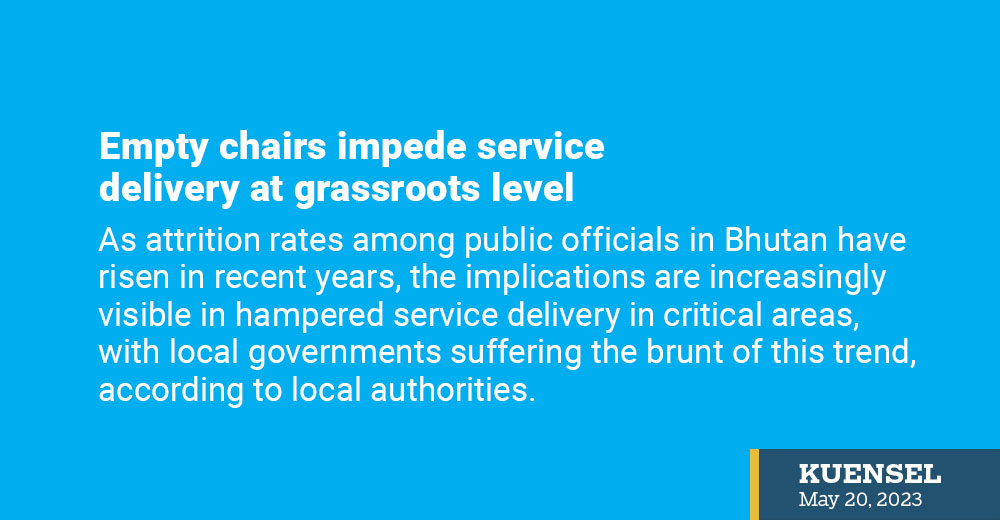KP Sharma
As attrition rates among public officials in Bhutan have risen in recent years, the implications are increasingly visible in hampered service delivery in critical areas, with local governments suffering the brunt of this trend, according to local authorities.
Architect, environment officer, chief education officer (CDEO), human resource officer (HRO), chief engineer, internal auditor, procurement officer, agriculture officer (DAO), economic development officer (EDMO), and legal officer positions are currently vacant in Thimphu.
During a recent Dzongkhag Tshogdu (DT) session, local leaders expressed their disappointment and urged relevant authorities to expedite the recruitment process for these positions as the absence of these officials has severely affected the people.
Sonam Zangmo, Chang Gup, said the challenges of obtaining direct consent from the government before erecting structures taller than three stories. “We would appreciate it if the approval could be granted at the dzongkhag level, just like for one and two-story houses,” she said.
Applications are being sent to the ministry because the dzongkhag lacks essential knowledge, and the architect is on extraordinary leave (EOL). According to sources, the ministry’s lone architect is responsible for eight gewogs in Thimphu and ten gewogs in Paro.
Phub Dorji, the dzongdag of Thimphu, admitted that the dzongkhag has appointed officiating officers as an interim solution to reduce service delays. However, he highlight that occupations that require specific skills cannot be effectively substituted.
He added that the dzongkhag is in constant communication with relevant authorities to expedite the recruitment process for the vacant positions. He noted: “We cannot directly request the Royal Civil Service Commission (RCSC) as the process needs to go through relevant agencies and ministries.”
Birkha Bdr Rai, the Chukha DT Thrizin, stated that the shortage of officials is also prevalent in gewogs under Chukha dzongkhag. For instance, Metakha gewog lacks an agriculture extension officer responsible for overseeing agriculture-related plans and programmes.
Additionally, Bongo gewog is without an administrative officer (GAO) and community center operator (CC), while Phuentsholing and Logchina gewogs share a livestock officer. The decision on whether to include these issues on the agenda for the upcoming DT session is yet to be determined.
DT Thrizin of Tashigang, Duptho, highlighted the shortage of engineers, architects, and land record section officers, which are crucial for daily interactions with the public. He noted that the shortage in various sectors increases the burden on the remaining officials, making it challenging for individuals to access services promptly.
Duptho expressed hope that ongoing reforms in the country would address these issues, as they are intended to bring about positive changes.
In Samtse, there is a shortage of officials in the engineering, livestock, and agriculture sectors, according to DT Thrizin Nima Dukpa. Presently, the dzongkhag lacks a planning officer, and Ugyentse gewog has a vacant position for an agriculture officer. Tendu Gewog has been without an administrative officer for over two years, and there is also a shortage of livestock officer in the gewog.
Nima Dukpa emphasized that prolonged vacancies inevitably impact service delivery. Similarly, Mongar faces a shortage of livestock officers and Royal Natural Resource centers, which are essential for supporting farmers.
DT Thrizin pointed out that although assistant officers can temporarily replace some officials, the problem arises when there is no one to shoulder the responsibility. Losing experienced officers with profound knowledge in their respective fields cannot be adequately compensated even when replaced by younger individuals.
While Sarpang lacks sufficient human resources in the land record section, Trashiyangtse faces a shortage of RNR extension officers. Most local leaders agree that when officials resign and leave the country, it takes time to find suitable replacements.
They further added that assigning additional responsibilities to existing officials only exacerbates their workload, leading to more resignations. Multiple tasks assigned to officials hinder efficient service delivery and cause delays in people receiving timely assistance.
Local leaders from other dzongkhags said that although there has been an increase in the number of individuals leaving the profession in dzongkhags and gewogs, there are no major issues currently affecting their regions.


